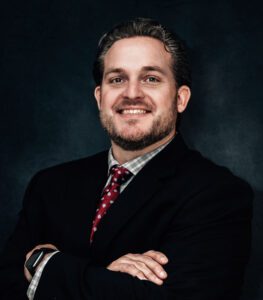I never had money growing up. We moved between rental properties and lived with my grandparents nine times by the time I was a senior in high school. At that time, my parents finally bought a house. We struggled, and at times, things were tough. My mother took care of my sister and me, and my father worked seasonally in the trades. He was a good man, but he had his demons. He battled addiction until it led to his eventual passing at 41 years old. Twenty years later, we lost my sister due to those same struggles with addiction. We’ve had our share of heartache. But because of the struggles I witnessed my parents experience as a kid and the subsequent challenges that arise from that lifestyle, I knew what I wanted out of life. More importantly, I knew what I didn’t want in life.
I share this because people have often assumed that I inherited my way into entrepreneurial success. That couldn’t be further from the truth. It’s natural for people to make assumptions, and I don’t fault anyone for that. They may not know that my father was an addict whose addiction led to his passing at 41. They may not know that I could only attend college because of athletic scholarships. They may not know that I spent 10 years in the military to better prepare myself for the future and that I’ve had to bury more friends and family than I care to remember. They may not know that I was in the mountains of Afghanistan when my wife gave birth to our only child. Or that I lost my sister to addiction twenty years after we lost my father. So no, there hasn’t been any inheritance, but I’ll be sure to report back if it comes!
The reality is that my wife and I struggled immensely when we were first married and in the years that followed. It’s been a slow road, but I’m proud to say that we’ve built a good life, and we’re comfortable. I take solace in knowing that my wife and daughter will be able to live comfortably even if I am unfortunate enough to depart this earth too early.
The legacy type of financial security didn’t come from my wife and me working regular jobs. Instead, it came from everything that we did outside of work. Most people will never achieve their financial goals by only trading time for dollars. I’m currently 41 years old, and I’ve started, bought, and/or sold over a dozen different businesses in the last 12 years. During that time, I’ve bought or sold dozens of pieces of real estate and have surrounded myself with people who are smarter than I am. So, how did I get here?
I’d like to say that it’s all due to hard work, but that isn’t entirely true. It’s really a combination of hard work, fortuitous circumstances, having confidence in my abilities, and being willing to seize opportunities when they present themselves. More specifically, it’s because of the 10 principles that follow.
1. Be kind to others
This may seem somewhat simple, but to me, it’s been the most crucial piece. Genuine acts of kindness go a long way. I’ve had more opportunities arise simply by being kind to people. When I was 22, I bought my first house. I had some senior neighbors across the street who I’m pretty sure hated me, and rightfully so, I was an animal. At 22, I was definitely drinking too much and having more parties than I should have. One day, as I was unloading groceries, I saw my neighbor outside watering his flowers. I grabbed two packages of steaks and introduced myself, apologizing for my past behavior. That small gesture led to a friendship I still have with him and his wife today. As luck would have it, this same man happened to own a lot of real estate. I never knew that prior to handing him those steaks. Fast forward a year, and it was that same man who introduced me to the concept of land contracts and ultimately convinced me to do my first rental property.
2. Get lucky
That might seem like an odd thing to say, considering that you can’t 100% create your luck. What I’ve found is the harder I work, the luckier I get. There’s a quote from a Roman philosopher that drives this point home, and I often remind my daughter of it: “Luck is what happens when preparation meets opportunity.” Put in the work now, so you are prepared when the opportunity arises. Once you’re prepared, you’ll be surprised by how your luck changes.
3. Be willing to take some risk
A few years after the first property, an opportunity presented itself to purchase two duplexes. The problem was I needed $15K as a downpayment, and wouldn’t you know it, I was about $15K short. I ended up bringing a friend in with me (more on that below) to share in the risk and responsibility. That still left me $7,500 short. Then I remembered that I had some money in my military retirement account. Against the advice of my accountant, I cashed it in to buy the properties. That $7,500 was a significant amount, but not enough to ruin our lives if we lost it. In fact, it didn’t even seem like I had the money because it was in an account I never touched. Looking back, it may not have been the smartest move at the time, but it ended up being one of the best financial decisions I ever made. It’s not like I had that money in my budget, so I was willing to risk it. You have to be willing to put some skin in the game to advance. That “skin” is what serves as motivation. I’m not suggesting cashing out your 401K or spending your entire nest egg, but weigh the risks and think, “what’s the worst that can happen if I lose this money.”
4. Think long term and look for the less glamorous opportunities
Unless you win the lotto, you’re not going to get rich overnight. Real estate has dominated my path to success, and it has always been a grind. Only in the past 4-5 years are we really seeing the returns. Think long term.
5. Be willing to put in the work
If it were easy, everyone would do it. To this day, I work a lot of hours per week on the side hustles in addition to my day job in insurance. The thing is that I enjoy it (most of the time). I get to meet interesting people, make connections, and help people out. I even involve my wife and daughter in the different businesses at times. When my daughter was younger, she knew that most evenings were going to be spent working at one of the properties while mom was doing shiftwork. She’s 14 now and has an outstanding work ethic. She credits that to how she was raised and being shown that there is something rewarding about putting in the work.
6. Embrace the idea of having partners
Many hands make light work, and having partners spreads both the risk and the responsibility. I can’t tell you how many small business owners I’ve met who are just burnt out and overwhelmed. The problem is most people are terrified to get involved with a partner. It can be scary, which is why you need to be selective . Understand what their motivations and goals are. Set clear expectations and agree on shared goals. Things will happen, and as times change, needs change. Be adaptable and empathetic. People are always fascinated when I tell them that I usually partner with one or more people on my ventures. They think it’s even crazier that I usually partner with friends. Again, setting expectations is key! But for me, why wouldn’t I partner with my friends? They are some of my favorite people who I enjoy spending my time with. They also know me well, and I know them. That’s not to say I want to partner with every friend, but some make sense.
7. Embrace the OPP (yeah, you know me!)
OPP stands for “Other People’s Money.” You’d be surprised by the number of people who have some cash set aside that they don’t know what to do with. If you have a strong work ethic and a solid reputation, that’s the easiest way to secure the funding you need. Negotiate a fair deal between yourself and the lender. It’s hard to get money from a bank when you’re starting out or venturing into something they may not understand. Meanwhile, that neighbor across the street who recently retired may be tired of watching his money vanish every time there’s a hiccup in the market. Maybe they are willing to take a little risk and back someone they know on a project they can see. A few key points here – 1. Have a plan in place before approaching someone for private lending. Being unprepared is a huge red flag for me when someone is looking for an investor. 2. Everything needs to be in writing with clear terms and schedules. 3. Don’t burn bridges. If you say you are going to pay someone back with certain terms, you need to do that. Have a contingency in place in case things go sideways. It takes years to build a good reputation and only a second to destroy it.
8. Work your plan
I mentioned the importance of having a plan. I can’t stress this one enough. It’s easy to overthink and get lost in the weeds when starting off. If you try to plan every detail, you’ll drown. Instead, develop an outline and define the priorities. Work on the top priorities first. Why are you starting this venture, and what needs to be done to get it moving? That’s where the focus needs to be. Stay away from things that are not essential. You can always adjust your course down the road as needed to address those lower priorities that are nice to have but not required to move forward.
9. Diversify your group
The worst attribute of a partner for me is someone who is exactly like me. I don’t want someone who thinks the same as me or who has the same skill set. I want to be challenged, and I want my partners to be honest with me. I have the same criteria for my friends. Like I said before, I like to surround myself with people who are smarter than me, specifically people who have unique skills or connections that can help the business. Don’t fall into the trap of surrounding yourself with only people who think like you, look like you, and always agree with you. When you find the right people, understand that you’re going to clash. That’s okay; you’re different people. Make it your standard practice to make up quickly and let them know how much you appreciate what they bring to the table.
10. Share your knowledge
This ranks up there with being kind. If you know something that can help someone, share it! There’s enough success to go around in this world. That’s always been important to me as I’ve grown as a person, and I’ve tried to teach my daughter to be the same way. Be a cheerleader for others. And if someone is doing well, don’t be mad at them. Use that as motivation to improve your own situation. When you embrace this mentality, people recognize that you’re secure with yourself, and you become more likable. In turn, other people want to see you do well too. Then you’ll see more opportunities come into play because you’re not a threat – you’re an ally on a different path. You’re always going to have some who root against you. It is what it is. That’s their own insecurities. Don’t give it a second thought. I wouldn’t be where I am today if it weren’t for so many other people who threw me a bone along the way. Because of those being willing to share their knowledge, I feel like I have a duty to do the same. Today, I love when I’m able to give someone a leg up just by sharing what little I’ve learned along the way.
One thing I’m certain of is that there are numerous paths to achieving your financial goals. What has worked for me may not be a one-size-fits-all solution, and that’s perfectly fine. The crucial point is recognizing that you don’t know what you don’t know. Every time I embark on a new venture or assist someone with theirs, I uncover fresh insights. Embrace the knowledge that comes your way and piece together what aligns with your journey.
I hope you’ve found inspiration in reading about my experiences. If you aspire to start your own venture, remember this: tomorrow isn’t guaranteed, and there will never be a “perfect” moment. Seize the opportunity, embrace the journey, and never stop pursuing your dreams. And if there’s ever anything I can do to support your endeavors, don’t hesitate to reach out. My aim is to empower more individuals to find their path to success.
James Hazzard is the owner of Samuelson Insurance Agency in Portage, Indiana. With years of experience in the insurance industry and entrepreneurship, he aims to educate readers and clients on various insurance and entrepreneurial related topics to help them make informed decisions. Please note that the views expressed in James’ articles are his opinions and should not be considered professional advice.


